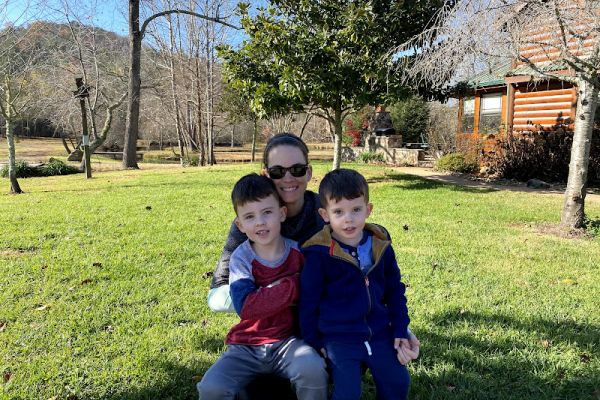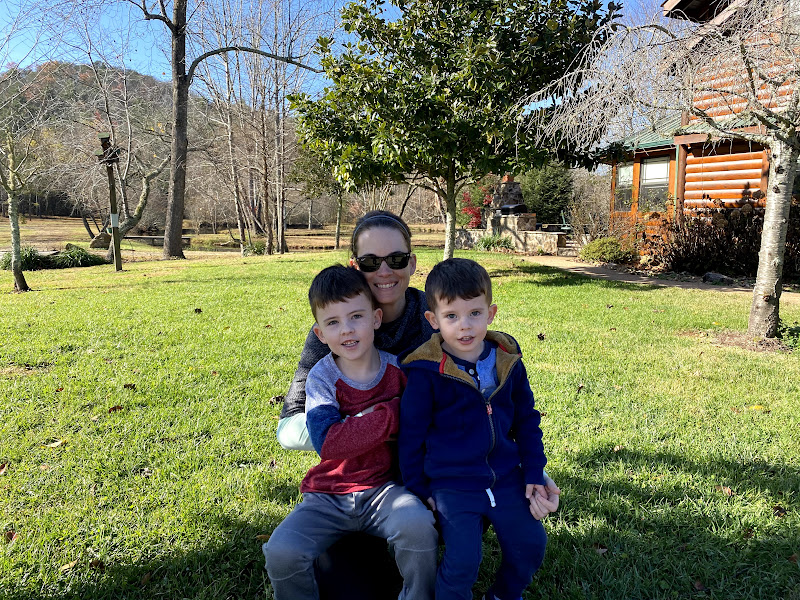
A Reluctant Advocate
| EFMP Stories, Resources
When it comes to being an advocate, I don’t believe we’re born. I think we’re–often reluctantly–created. Molded by our experiences, our failures, our triumphs and most importantly, by a deep desire to help our children. If you asked me in 2019, when my then four-year-old was diagnosed with autism, if I would be sitting here writing this, I would’ve laughed at the absurdity of it all. But three years later, here I am, a reluctant advocate.
Written by Melissa Flynn
Our diagnosis came after a long road of military PCS (Permanent Change of Station) moves and waitlists. For two years we sat, waiting for a doctor to confirm what we suspected. Two years that we missed out on key therapies, at the mercy of the Army and where they decided to send us. And just like that, five weeks before our next PCS, in a whirlwind appointment that lasted less than 20 minutes – we had our answer: autism. Before we could even catch our breath and finalize our Exceptional Family Member Program (EFMP) application packet, we moved to Fort Campbell.
Our DODEA Experience
Campbell was our first choice due to our previous experiences with the Preschool Services for Children with Disabilities (PSCD) program through DoDEA (Department of Defense Education Activities). We had such a positive outlook on the staff, the curriculum, and the structure it provided our son that we chose our next duty station because of the DoDEA schools. When we landed in KY in the Spring of 2019, we hit the ground running. We found an amazing ABA (Applied Behavioral Analysis) therapist to help my son increase his communication skills and decrease negative behaviors. In addition, we enrolled in private Speech and Occupational Therapy, as well as continued the PSCD program through our new school.
Fast forward to the 2020-2021 school year, and the cracks of DoDEA began to show when my son got a new case manager. In DoDEA, a case manager is our point of contact for the school team that engages with our child at school. The case manager is responsible for helping write the Individualized Education Program (IEP), leads all meetings, ensures data is taken correctly, analyzes data and provides progress reports. In many cases, they are also our child’s resource/special education teacher. Being a newer special education parent, I trusted that the team was doing everything in their power to follow my son’s IEP; stretching him where needed and providing modifications and accommodations where he struggled.
It wasn’t until Spring 2021 that I was rudely awakened to the fact that our case manager was not following my son’s IEP, not spending the required frequency/durations in the general education classroom, or providing direct special education instruction time. After requesting his IEP data, I couldn’t even decipher which goal the data was supposed to describe. For example, with his sight word goal, the data taken did not calculate which words he was mastering; instead, it listed notes on what he was doing, almost like a journal of his day:
“We went to the library where he picked out a book on dinosaurs.”
Goals that had been listed as “mastered” on our progress reports, were actually not mastered when sifting through the muddled data. My son had been working hard all year, but as I discovered, the team had not tracked his progress appropriately at all.
It was a failure on multiple levels, including my own innocence to the broken system we were thrust into. Quickly, I enlisted the help of school administrators. In my naiveness, I truly believed it was a speed bump that could easily be maneuvered and we’d be back on track, merrily going down our path. How wrong I was. The web began to unravel and by the end of the school year, there wasn’t enough applicable data to provide a year-end progress report. And this was after months of emails, phone calls and meetings to resolve our problems.
A Reluctant Advocate No More
I spent the summer taking parental IEP classes put on by local advocates, reading books and getting up to speed with special education legal jargon, as well as reading through the Individuals with Disabilities Education Act (IDEA). I was a full-time mom, military spouse, therapist, educational support and now I could add “IDEA enthusiast” to my resume. With newfound knowledge and a new determination, I entered the 2021-2022 school year better equipped to handle anything that may happen. I ran for school board on the premise that I could be a voice for our kids with additional needs – and won the seat for our DoDEA school. Now, I had access to a larger group of administrators and district-level specialists. I was no longer a reluctant advocate. Everything was looking up.
And then…it happened. Again. After requesting data following the 1st quarter, we had the same issues. A different team; but the same issues. Data was muddled, or not applicable to my son’s goals. In many instances, data was skewed by team members not understanding how to capture the data. It appeared as though my son was making great strides. When in reality his progress either stagnated or regressed in many educational areas.
For example, his goal of counting by 2’s, 5’s, and 10’s showed a 78% success rate in quarter one but fell to just 11% after I evaluated the data and pushed back on the team to clarify how they were teaching the goal.
In my experiences with my son, he had never been able to accomplish this! I wanted to know their secret so I could effectively reinforce it at home. As it turned out, the data was not being taken correctly. Twelve out of his fourteen goals showed regression from anywhere between 8-66%. I felt utterly defeated. How… after all this time and effort, could the systems put in place by DoDEA continue to fail my son and his needs? I couldn’t be the only one, could I? In my blind trust in the system, I believed I was. I considered us “unlucky”, and that this was just another little speed bump in our educational journey.
(Check out these tips from Wright’s Law to get an idea of how IEP goals should be written.)
Building a Network of Reluctant Advocates
I began reaching out into the community, asking others if they had similar issues. My fears were confirmed, yes, other families were experiencing problems. So, I decided to ask a simple question on a local Facebook group for special needs families. The request was simple:
“If you have faced any issues with DoDEA schools, could you please message or comment and let me know?”
– Melissa Flynn asked other parents to share their experiences
Within minutes, my inbox was flooded and the comments on the post grew from other reluctant advocates. I had moms afraid to document their issues in email or messenger, concerned about the blowback for their children or their spouses’ careers. Instead, I spent my mornings meeting up with them at the Exchange food court or chatting with them on the phone. Strangers, people I had never met, who shared their children’s most vulnerable stories with me. We understood each other in ways that even some of my closest friends will never understand. It was equal parts refreshing to realize I wasn’t alone, and yet utterly heartbreaking.
It wasn’t just us.
Children were being overlooked to the point where they would have accidents at their desks. Students were being ping-ponged from school to school to help “meet the needs” of the child. However, in many cases, a failure by the school occurred and an opportunity to start fresh was given. Children were eloping off school grounds multiple times, with few proactive measures implemented to help contain future incidents. Parents would arrive at schools with their child in crisis, only to discover an injury or substantial communication regression, indicating that their child felt unsafe. IEP failures were a common theme. The heaviness weighed on me. On the extreme end, our children were being mistreated, in rare cases, neglected. The less frightening stories focused on how they were “simply” having the laws outlined in the IDEA broken repeatedly.
And thus, an advocate was created.
I compiled the stories, and with the help of one of these moms, we met with our district superintendent and instructional systems specialist. Momentum was slow at first. As part of the documentation, I came up with possible solutions to help some of the more systemic issues I ran across. Simple things for us, but that would be greatly beneficial for an educator to understand the inner workings of our child:
- Filling out a “get to know my child” document,
- Holding roundtable discussions with staff,
- Placing children in classrooms that compliment the strengths of the teacher,
- Emphasis placed on training needs,
- Increased awareness of the burden admins and staff have regarding the percentage of kids with IEPs, and
- Holding listening sessions with district reps.
Celebrating Small Wins
This past Spring, our Superintendent was able to receive funding based on these listening sessions and their findings. As a result, Fort Campbell now has a pilot program to bring in SpED-specific Assistant Principals to help bring lasting change to the culture and community.
While much remains in limbo coming into the new school year, I know that the changes currently underway would not have happened were it not for these families willing to speak out as reluctant advocates. I was one mom, with one son, in a system I *thought* was great. Through our shared experiences, I was able to give a voice to dozens of families. More importantly, we were able to give the hope that the kids that came after ours would be in better hands. And THAT is how advocacy is ignited.
We are stronger together than when we are in our vacuums, struggling alone to make sense of this educational tailspin we often find ourselves in. All it takes is one spark.
…And if you had told the version of me in 2019 that I would have been the catalyst in this scenario, I would have politely told you that you were crazy.
About the Author

Melissa Flynn is a military spouse of 11 years and married to an Army aviator. In her previous life, before becoming a mil-spouse and mother, Melissa worked as a marketing director for a nationwide life insurance company. Melissa also has vast experience in project management and finance. She is currently a business analyst for a medical mergers and acquisitions company. She graduated from the University of Arizona in 2006.
Melissa has two sons, her oldest is on the autism spectrum. Her youngest is an enthusiastic advocate-in-training and will move mountains one day… if she survives him! A reluctant advocate no longer, Melissa currently serves as a school board member for Fort Campbell schools and has become a point of contact for local special needs parents when it comes to their child’s education.





You are AMAZING. B is oh so lucky to have you as his mama. Keep kicking butt 💗
Beautiful story. Thank you for sharing.
You really are a super mom! Your drive to find solutions not just for your family, but to make lasting changes to a completely broken system, is inspiring. You’re a testament to the power one person can have!
Aunt Marsha forwarded this article to me and I applaud you Melissa. You have set a stellar example for every Mom with “blind trust in the system” – every child has “special needs” to explore. I was so proud of your role on the Fort Campbell School Board and promoting the truth that we are all better together.
We love and care about your little family – Aunt Susie